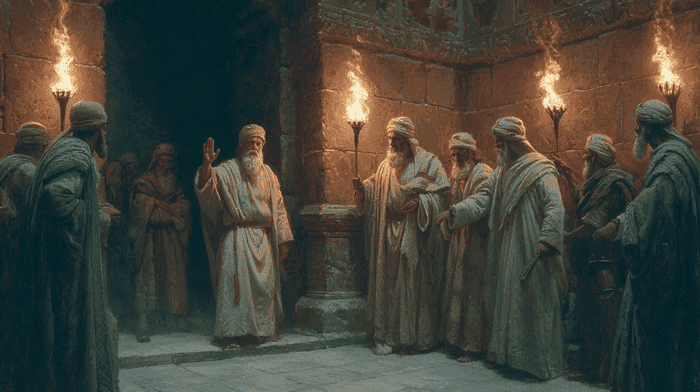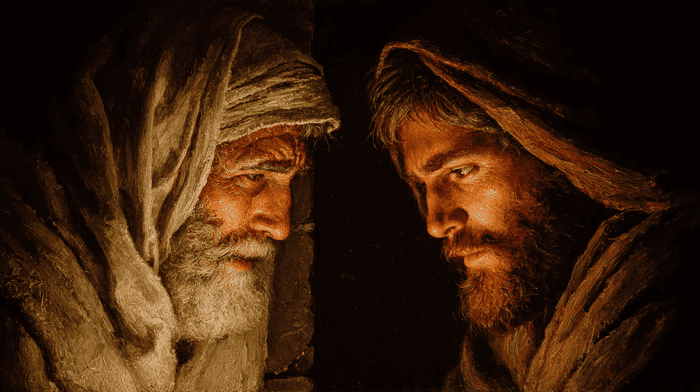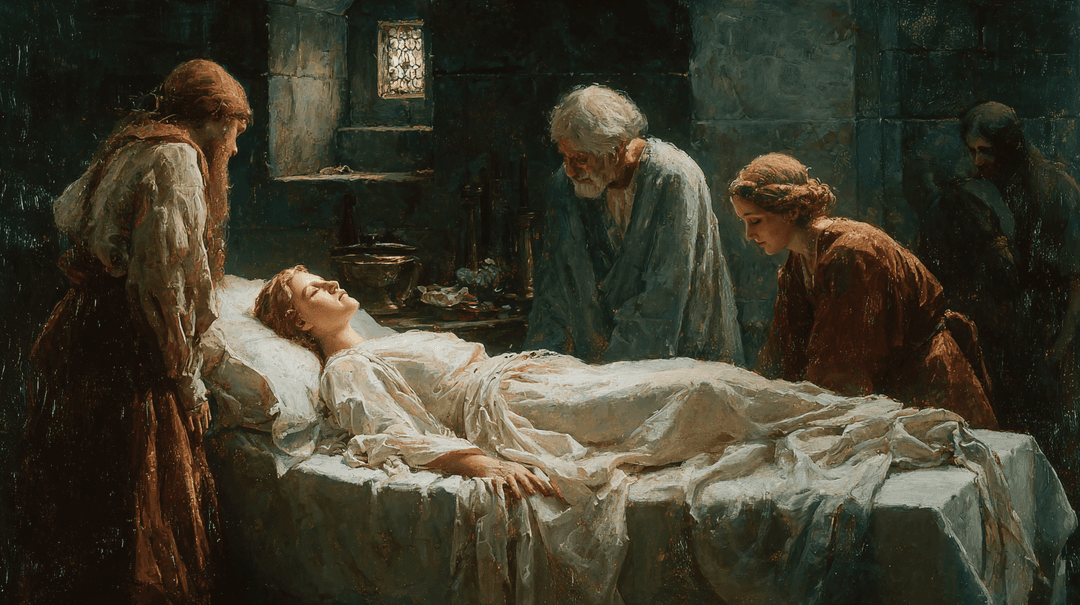Who Is Nicodemus in the Bible?
Nicodemus is one of the more intriguing figures in the Gospel story. He doesn’t come charging in with accusations like some of the other religious leaders—he approaches Jesus with something rare for his position: honest curiosity.
You won’t find him in Matthew, Mark, or Luke; everything we know about him comes from the Gospel of John. That’s where we learn he was a Pharisee and “a leader of the Jews” (John 3:1, NRSVCE)—someone with real influence, likely part of the powerful Jewish council that shaped religious and civic life.
To really get what’s going on in the story of Nicodemus, though, we need to understand the world he came from—and just how surprising it was for someone in his role to be drawn to Jesus instead of threatened by Him.
So, who were the Sanhedrin?
The Sanhedrin in the Bible was the supreme council for the Jewish people during the Second Temple period. The seventy-one members, including chief priests, scribes, and elders, were handling both religious legislation and civil law.
Its foundation goes back to the seventy elders Moses appointed in Numbers 11:16-17 (NRSVCE). Over time, especially under Roman rule, the Sanhedrin maintained internal authority but lost the power to execute capital punishment without Roman consent.
Composed of both Pharisees and Sadducees, the council reflected a mix of theological and political views. The high priest presided over the assembly.
In the New Testament, this council comes into focus particularly during the trials of Jesus and the apostles (see Matthew 26:57-68; Acts 5:27-40, NRSVCE). It’s in this very circle that Nicodemus’ story unfolds, adding weight to every word he speaks. His quiet challenge to their proceedings in John 7 reveals just how risky it was to defend Jesus.

How Many Times Is Nicodemus Mentioned in the Bible?
Nicodemus shows up only three times in the Gospel of John, but each moment tells us something deeper about who he is—and who he’s becoming.
The first time we meet him (John 3:2, NRSVCE), he comes to Jesus at night, quietly saying, “Rabbi, we know that you are a teacher who has come from God.” That’s a bold thing for a Pharisee to say.
And instead of brushing him off, Jesus offers one of the most profound teachings in all of Scripture: that to truly see the kingdom of God, you have to be “born from above” (John 3:3, NRSVCE). Nicodemus doesn’t quite understand yet, but he listens.
That conversation leads to the famous verse John 3:16 (NRSVCE), which has become the heartbeat of the Christian message: “For God so loved the world that he gave his only Son, so that everyone who believes in him may not perish but may have eternal life.”
The next time we see him (John 7:50-51, NRSVCE), Jesus is on trial before the religious leaders, and Nicodemus speaks up—carefully. He reminds them that the law says a man should be heard before he’s condemned. It’s not a grand act of faith, but it’s a crack of light in a very dark room.
And finally, in John 19:39-40 (NRSVCE), after Jesus has been crucified, Nicodemus steps fully into the open. He helps bury Jesus, bringing an expensive mix of spices—something fit for a king. No more shadows, no more caution. It’s a quiet but powerful act of love and courage.
Nicodemus doesn’t have many lines in the Bible, but his story speaks volumes. He starts off searching in the dark and ends up honoring Jesus in broad daylight. His faith doesn’t come all at once—it grows, quietly and sincerely, like it does for so many of us.
Nicodemus and Jesus: A Nighttime Conversation
In what may be one of the most iconic passages in Scripture, Jesus and Nicodemus engage in a deep theological discussion. Jesus tells him in John 3:3 (NRSVCE): "Very truly, I tell you, no one can see the kingdom of God without being born from above".
Nicodemus, taking the phrase literally, is confused, but Jesus continues: “No one can enter the kingdom of God without being born of water and Spirit” (John 3:5-6, NRSVCE).
"Born from water" probably points to baptism, but being born from the Spirit alludes to something deeper: surrendering ourselves to the power of the Holy Spirit, which is in each one of us, and letting it reshape and transform us.
Why Did Nicodemus Come to Jesus by Night?
The fact that Nicodemus and Jesus meet under the cover of darkness could suggest:
- Fear of being seen - Nicodemus was a Pharisee, and he couldn’t risk being seen in public with Jesus, given the adversity He was facing at that point;
- A symbol of his spiritual condition - At the beginning of his journey, he is still in the darkness;
- The perfect moment for deep, honest questions - The night is usually a time of reflection, honesty, and mystery.
But what begins in darkness moves toward light. In his final appearance, Nicodemus steps forward in daylight to care for Jesus' body. A subtle but profound metaphor for transformation.

Get Closer to God Today
4.9
Average Rating
|Over 5 Million Downloads
The Story of Nicodemus in the Bible: A Slow Conversion
Nicodemus’s story is a beautiful example of what a slow, honest journey of faith can look like. He doesn’t have a dramatic conversion scene or a bold public speech. Instead, we see a man who starts with questions, wrestles quietly with what he hears, and slowly lets truth change him from the inside out.
The first time we meet him is in John 3. He comes to Jesus at night, literally in the dark. That moment captures more than just secrecy; it reflects where he’s at spiritually. He’s curious but unsure, respectful but hesitant. There’s no big declaration of faith, but the conversation he has with Jesus plants something in him. A seed.
Then in John 7:50-51, we see a shift. When the religious leaders are condemning Jesus, Nicodemus speaks up, carefully. He doesn’t say, “I believe,” but he reminds them of their own law: that a person deserves to be heard before being judged. It’s a small moment, but meaningful. He’s not just listening anymore, he’s starting to stand apart, even if just a little.
The real turning point comes in John 19:39-40. After Jesus had been crucified and most of His followers had gone into hiding, Nicodemus showed up in broad daylight with Joseph of Arimathea. They prepare Jesus’ body for burial, and Nicodemus brings a staggering amount of burial spices, enough for a king. This isn’t something you do in secret. It’s a public act of reverence and love. He’s no longer a bystander; he’s all in.
So, does Nicodemus follow Jesus? The Gospel doesn’t spell it out, but his actions speak volumes. He moves from quiet questions to costly devotion. And that mirrors the journey so many believers take—not a flash of instant faith, but a slow unfolding, step by step.
Early Christian tradition (especially in Catholic and Eastern Orthodox circles) sees Nicodemus as a saint, even a martyr. Other early writings, like the Gospel of Nicodemus, reflect that deep respect.
His story is a reminder that it’s okay to take your time. Faith doesn’t always start with certainty. Sometimes it starts in the dark, with a question, and grows into something brave.
How Did Nicodemus Die?
The Bible does not record what happened to Nicodemus, but early Christian tradition and historical writings provide some insight into his life after Jesus’ death.
Following his bold act of publicly assisting in Jesus’ burial, many scholars believe Nicodemus faced consequences for his allegiance. According to some apocryphal texts, such as the Acts of Pilate, also known as the Gospel of Nicodemus, he became a follower of Christ and was eventually expelled from the Sanhedrin and ostracized by Jewish authorities.
Church tradition, particularly within the Catholic and Eastern Orthodox communities, holds that Nicodemus was baptized by Peter and John and lived the remainder of his life as a committed disciple.
One tradition claims that Nicodemus was martyred for his faith. It is said that after he was cast out of the synagogue and deprived of his office and possessions, he was beaten to death by hostile Jews for his loyalty to Christ. His body, according to this account, was buried alongside that of Saint Stephen, the first Christian martyr, in a common grave.
The Eastern Orthodox Church commemorates Nicodemus as a saint, honoring him on August 2nd (or August 3rd in some traditions), recognizing both his spiritual journey and his courage in the face of persecution.
While these traditions are not found in canonical Scripture, they reflect the esteem in which Nicodemus was held by the early Christian community. His legacy as a Pharisee who sought and embraced the truth continues to inspire believers today.

What Can We Learn from Nicodemus?
Nicodemus started his faithful journey by asking questions and challenging the dogmas. This shows even the most cynical believer that it's okay to doubt, to ask questions, and to take your own time to arrive at God.
Unlike the disciples who dropped their nets and followed immediately, Nicodemus moved slowly. His story is a reminder that faith doesn’t have to look a certain way. You can start from a place of uncertainty, you can wrestle with questions, and you can absolutely grow in stages.
Sometimes, real courage is quiet. It’s not a big speech or a grand gesture—it’s showing up, even when it’s hard. Nicodemus shows us that people who seem stuck in tradition, who live inside systems that resist change, can still be moved by truth.
In the end, he didn’t just believe in private. He honored Jesus when it mattered most, not with words, but with presence, with risk, and with love.
Get Closer to God Today
4.9
Average Rating
|Over 5 Million Downloads
Get More Support with Bible Chat
The story of Nicodemus has the power to awaken your curiosity. If you want to find more about the Scripture, the Bible Chat App is a great resource. You can ask questions and receive biblical answers, rooted in Scripture and theological tradition.
📱 Download the app today from Google Play or the Apple App Store.
Conclusion: Who Was Nicodemus?
Nicodemus was a Pharisee, someone with a rigorous religious upbringing. But in his search for truth, he proved he was willing to go past his limitations and sacrifice the man he once was to pursue a different path, the one taught by Jesus.
His story is brief, as he only appears three times in the Gospel of John, yet it's full of meaning. He first meets Jesus under the cover of night, full of questions. Later, he speaks up—carefully but meaningfully—when Jesus is being judged. And finally, he shows up at the burial, bringing costly spices and helping lay Jesus to rest. By then, he’s no longer hiding.
As a respected member of the Sanhedrin, Nicodemus had a lot to lose. But what stands out is how his faith grew not despite his status, but within it. He had an open heart and genuine curiosity, so he listened carefully and, eventually, chose the best path for himself.
Nicodemus' story is an excellent portrayal of a common process the faithful go through. Maybe for some people, God just exists, no questions asked. Yet for others, there is doubt and hesitation, and that's just natural.
The beauty of the process is in the resilience one shows on the path to God. It's in the steps taken towards the light, even when those steps are uncertain. And in the faith that one day, all that confusion will go away and will be replaced by loving conviction.
References
- The Holy Bible, New Revised Standard Version Catholic Edition (NRSVCE)
- "John" in The New Interpreter's Bible Commentary, Abingdon Press
- GotQuestions.org, "Who was Nicodemus in the Bible?"
Image Sources: Midjourney.com










